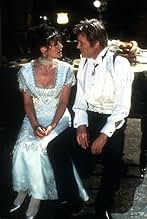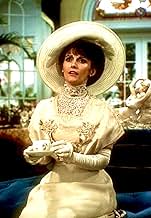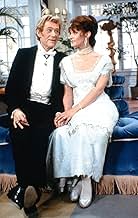The standard George Bernard Shaw story, with a provocative rendition by Peter O'Toole. He knows how to talk, but does he know how to behave towards a lady?The standard George Bernard Shaw story, with a provocative rendition by Peter O'Toole. He knows how to talk, but does he know how to behave towards a lady?The standard George Bernard Shaw story, with a provocative rendition by Peter O'Toole. He knows how to talk, but does he know how to behave towards a lady?
- Director
- Writer
- All cast & crew
- Production, box office & more at IMDbPro
Featured reviews
Both O'Toole and Kidder look like ghosts in this television adaptation of the classic Shaw play about a stuffy phonetics teacher who takes a common flower girl the ways of being a lady. Although O'Toole fares well as Henry Higgins, the production as a whole is a dreary affair.
While Peter O'Toole is one of my favorite actors, Henry Higgins is not his best role. where Harrison was crusty but childlike and Howard was snobbish but sentimental O'Toole is merely bombastic and bratty. no changes,no inner feelings,nothing. He is fun to watch but not at all what Higgins should be. Margot Kidder is laughable, not an ounce of Shavian expertise in her performance. John Standing is a very fine Col. Pickering. his is the best portrayal in the film. the actress who play mother higgins is also quite good and understands how to act in Shaw. the pace is good and the sets colourful but if you want to see this story at its best watch the original 1935 film with leslie howard or MY FAIR LADY with sir rex harrison.
Although this TV version, produced by Margot Kidder herself, is much closer to Shaw's original play than either the 1938 filming or MY FAIR LADY, I still find Wendy Hiller and Leslie Howard did the best job of realising the spirit of the play. The problem here is mainly in the casting. Margot and Peter are obviously trying their best, and are enthusiastic about the play, but it just doesn't come off. Peter O'Toole seems on the ragged edge of drunk most of the time. Margot Kidder is a bit too much "in your face" to produce the effect of sweetness which is basic to the character of "Eliza". Sure, she is a tough street girl, but she longs for affection and friendship as well as advancement in the world. Margot doesn't produce this effect. The two best acting jobs are by Frances Hyland as Mrs. Higgins, and by John Standing as Col. Pickering.
As for those who prefer MY FAIR LADY, I'll agree it is a beautiful spectacle, but that confounded "Opera Seria" format gets in the way of the story. If you eliminate the music, it's a pretty good "Pygmalion". But it's outrageously extrapolated from Shaw.
As for those who prefer MY FAIR LADY, I'll agree it is a beautiful spectacle, but that confounded "Opera Seria" format gets in the way of the story. If you eliminate the music, it's a pretty good "Pygmalion". But it's outrageously extrapolated from Shaw.
Peter O'Toole brings a different tone to the role of Henry Higgins than did Rex Harrison, the actor most commonly associated with the noted British linguist. O'Toole's talent is as undeniable and obvious as ever, but his performance is much wilder and rougher around the edges than Harrison's was. Unfortunately, Margot Kidder was not up to the role of Eliza Doolittle and the only thing worse than her "cultured" English is the lower-class Cockney dialect used early on. Frances Hyland stands out as Mrs. Higgins, Henry's mother, but the few other parts are given short shrift and are eminently forgettable.
Alan Cooke's direction is quite capable for a television production. Overall this version stands on it's own adequately enough, but it pales in comparison to the film "My Fair Lady."
Alan Cooke's direction is quite capable for a television production. Overall this version stands on it's own adequately enough, but it pales in comparison to the film "My Fair Lady."
Comparisons with "My Fair Lady" are unfair to this fine television version of "Pygmalion." O'Tool gives a wonderful eccentric performance as Henry Higgens and Margot Kidder is a fine Eliza, but the quality which I especially find valuable when I use this version to teach in my Introduction to Literature is the speeches both Mrs. Pierce and Mrs. Higgens give which are cut from the musical to make room for all that wonderful music. Thus the female voice of Mrs. Higgens, "No No, you two infinitely stupid male creatures!" (Act III line 198), is lost. Also the ending, which is even more vague than the musical about the future of the two main characters, is a wonderful leap off for class discussion about "middle class" expectations. I really enjoy all of this production.
Anderson Rearick Mount Vernon Nazarene University Mount Vernon, OH.
Anderson Rearick Mount Vernon Nazarene University Mount Vernon, OH.
Did you know
- TriviaThe original Broadway production of "Pygmalion" opened at the Park Theater opening October 12, 1914 and ran for seventy-two performances. The play premiered in a German translation at the Hofburg Theatre in Vienna on October 16, 1913 and in English at His Majesty's Theatre in London on April 11, 1914. The British production starred "Mrs. Patrick Campbell" and Herbert Beerbohm Tree.
- Quotes
Professor Henry Higgins: Pickering, shall we ask this baggage to sit down or shall we throw her out of the window?
- ConnectionsVersion of Kanske en gentleman (1935)
Details
Contribute to this page
Suggest an edit or add missing content

























